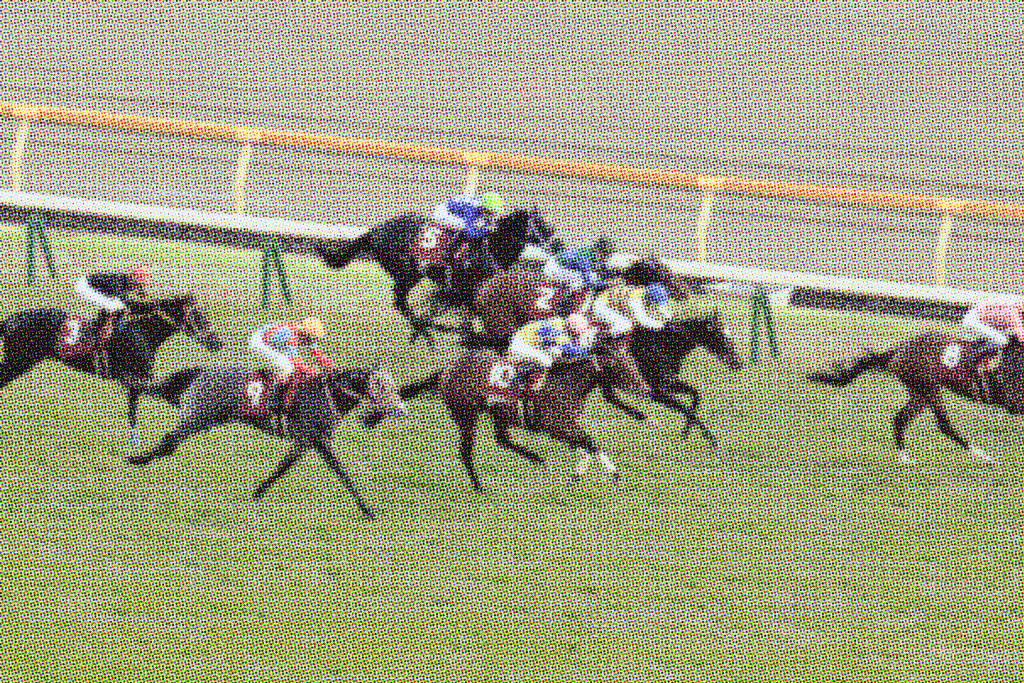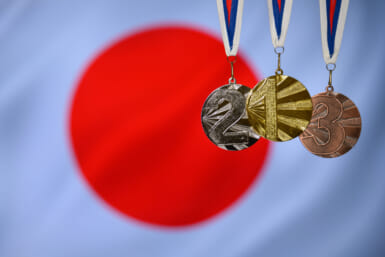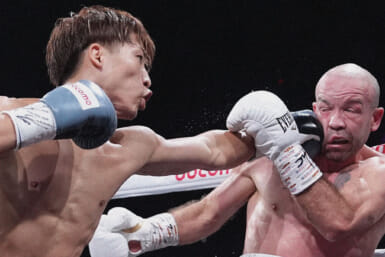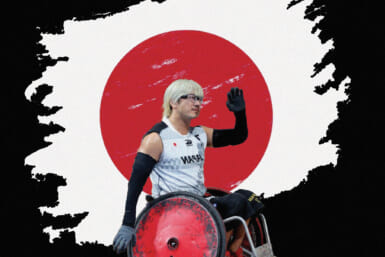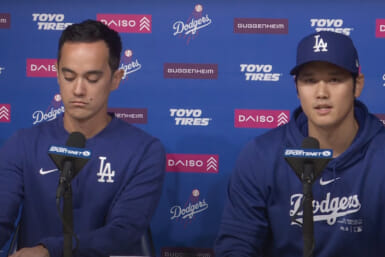Interest in Japanese horse racing has grown considerably in the last few years and not just amongst those who enjoy a flutter. The huge success of the manga, anime and mobile game series Uma Musume Pretty Derby has put a spotlight on some of the most high-profile thoroughbreds this country has produced. Some of the true greats, however, don’t feature in the multimedia franchise for legal reasons. That’s not an issue for us, so we decided to look at seven of the best Japanese racehorses over the past three decades.
1. Narita Brian: Trainer — Masaaki Okubo
Declared “horse of the 20th Century” in Japan, Narita Brian was the world’s top earner until 2000 when he was surpassed by T M Opera O. Sired by Florida Derby winner Brian’s Time, he made his debut in 1993 and went on to win the JRA Award for the Best Two-year-old Colt. His performances in 1994, however, were even better as he completed the Triple Crown (Japanese 2000 Guineas, Japanese Derby and Japanese St. Leger). His triumph at the St. Leger by seven lengths was the standout.
Narita Brian peaked in 1994 when he was named as the Japanese Horse of the Year. He still managed to record some standout victories after that, though, most notably successive triumphs at the renowned Hanshin Daishoten. In the second of those successes, he defeated his brother Mayano Top Gun, the country’s Horse of the Year in 1995. Sadly, Narita Brian died during his second stud season in 1998. His most successful offspring was Daitaku Flag who finished fourth in the Japanese 2000 Guineas.
2. El Condor Pasa: Trainer — Yoshitaka Ninomiya
Another thoroughbred, like Narita Brian, who’s often referred to as the “best Japanese racehorse of the 20th century,” El Condor Pasa finished his career with a Timeform Rating (widely accepted as a definitive assessment of racing merit) of 136. That’s the highest achieved by any horse trained in this country. Bred in Kentucky by Takashi Watanabe, he debuted here as a two-year-old in 1997 and won six of his first seven races, including most famously the Japan Cup.
In 1999, El Condor Pasa headed to France to compete in Europe’s most prestigious race: Prix de l’Arc de Triomphe. He was in fine form going into the famous event, having won the Grand Prix Saint-Cloud and the Prix Foy. Leading by three lengths into the final straight, he was sadly overtaken by Montjeu with 100 meters to go. Despite losing by half a length, his performance at the Paris Longchamp Racecourse inspired future Japanese thoroughbreds to take up the challenge, including the next two names on our list.
3. Deep Impact: Trainer — Yasuo Ikee
The most famous and arguably greatest ever Japanese racehorse, Deep Impact lost just twice in his glorious 14-race career. The son of Kentucky Derby winner Sunday Silence, Japan’s leading sire from 1995 through to 2008, he debuted in 2005. It proved a memorable year as he became the sixth stallion to secure Japan’s Triple Crown and the first since Symboli Rudolf in 1984 to achieve the feat while undefeated. Continuing that fine form into 2006, he was then flown out to compete in the Arc.
An overwhelming favorite, he finished a disappointing third. He was then disqualified after testing positive for the banned substance Ipratropium (used to treat respiratory problems). Returning home after that setback, Deep Impact produced arguably his greatest ever performance, winning the Japan Derby by two lengths. He retired in 2006, ending his career as Racing Post Ratings’ highest ranked horse. A superstar in his home country, he was crowned Japanese Champion Sire for 10 consecutive years from 2012 to 2021. His death in 2019 shocked the nation.
4. Orfevre: Trainer — Yasutoshi Ikee
A talented yet volatile horse, Orfevre achieved some memorable feats in Japan, including the winning the triple crown in 2011, yet it’s his performances in France for which he’s most remembered. Sent over for the first time in 2012, he triumphed at the Prix Foy and subsequently went into the Arc as slight favorite ahead of Epsom Derby winner Camelot. Opening up a clear lead with 200 meters to go, jockey Christophe Soumillon then veered sharply right towards the inside rail.
It proved costly. Orfevre was caught by French filly Solemia and agonizingly lost out by a neck. Returning the following year, he was again the favorite for the Arc after another victory at the Prix Foy. This time Soumillon tried to come from the back of the field, but left it too late, finishing five lengths behind winner Treve. Runner-up for the second consecutive year, Orfevre went back to Japan. A crowd of 124,782 watched his final race: the Arima Kinen. He won it by eight lengths.
5. Gentildonna: Trainer — Sei Ishizaka
While Deep Impact’s performances on the track were memorable, his stud record was, and still continues to be despite his death, even more impressive. He sired many stars including his most famous daughter Gentildonna. A two-time recipient of the Japanese Horse of the Year award, she won the Japanese Fillies Triple Crown (Japanese 1000 Guineas, Japanese Oaks and the Shuka Sho) in 2012 as a 3-year-old. Her most memorable victory, though, came the same year in the Japan Cup.
Rivals in the race included the aforementioned Orfevre, Japan’s Horse of the Year in 2011, and 2012 Arc winner Solemia. In the end, Gentildonna edged out the former by a nose. However, jockey Yasunari Iwata had to wait 20 minutes for the result to be confirmed following a protest about interference from Orfevre’s team. A year later, Gentildonna successfully defended her crown, becoming the first horse to win the famous race twice. Ridden by British jockey Ryan Moore, the margin of victory was once again by a nose.
6. Almond Eye: Trainer — Sakae Kunieda
Hailed by jockey Christophe Lemaire as “a horse of a lifetime,” Almond Eye retired in 2020 having won a record-breaking nine grade 1 events. The final win of her career was arguably the most impressive. Up against undefeated 3-year-olds Contrail and Daring Tact, it was one of the most anticipated races in recent years. Remarkably, though, with 500 meters to run, it was outsider Kiseki who was well out in front. Then came Almond Eye’s late turn of foot.
The magical mare eventually won by over a length to finish off her distinguished career in style. It was her second Japan Cup triumph. The first came two years earlier in 2018 when she broke the world record for a 2,400m-turf-race by 1.3 seconds. Highlights in 2019 included victories at the Dubai Turf and the Tenno Sho, which she won again in 2020. A two-time Japanese Horse of the Year, she retired as the country’s highest earning thoroughbred ever.
7. Contrail: Trainer — Yoshito Yahagi
If Gentildonna goes down as Deep Impact’s greatest ever filly progeny, then Contrail must be considered his number one colt offspring. Debuting in September 2019, he remained unbeaten until the end of November 2020 when he finished a length behind Almond Eye at the Japan Cup. Prior to that, he became only the third undefeated Triple Crown winner after Symboli Rudolf and his famous sire. It was also the first time in history for a father and son to accomplish the feat.
Contrail finished 2020 in joint 10th position in the World’s Best Racehorse Rankings and was considered the best 3-year-old over long distances. The following year, he competed in just three races, losing the first two. The Japan Cup, though, provided him with an opportunity to end his career on a high and that’s exactly what he did, finishing two lengths ahead of Orfevre’s colt Authority. The disappointment of losing his unbeaten record to Almond Eye in the same race a year earlier had become a distance memory.
Updated On January 21, 2024

